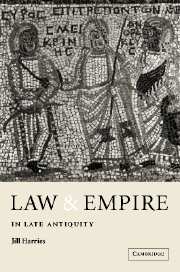Book contents
- Frontmatter
- Contents
- Preface
- Introduction
- 1 The law of Late Antiquity
- 2 Making the law
- 3 The construction of authority
- 4 The efficacy of law
- 5 In court
- 6 Crime and the problem of pain
- 7 Punishment
- 8 The corrupt judge
- 9 Dispute settlement I: out of court
- 10 Dispute settlement II: episcopalis audientia
- Conclusion
- Bibliography
- Index
4 - The efficacy of law
Published online by Cambridge University Press: 22 September 2009
- Frontmatter
- Contents
- Preface
- Introduction
- 1 The law of Late Antiquity
- 2 Making the law
- 3 The construction of authority
- 4 The efficacy of law
- 5 In court
- 6 Crime and the problem of pain
- 7 Punishment
- 8 The corrupt judge
- 9 Dispute settlement I: out of court
- 10 Dispute settlement II: episcopalis audientia
- Conclusion
- Bibliography
- Index
Summary
Emperors, and others, went to great lengths to advertise and strengthen the authority of law. Simultaneously, however, complaints flowed thick and fast from citizens and emperors about the failure of laws to be observed. As a result of such complaints, late Roman law is generally assumed to have been widely disobeyed, ignored or circumvented. Historians of Late Antiquity, following the rhetoric of some imperial legislation, have deplored the subversion of the ‘rule of law’ by corrupt activities on the part of officials and venal judges and habitual oppression of the poor by the rich, a picture which blends seamlessly with the notions of ‘decline’ accompanying the political disintegration of the western empire in the fifth century AD.
Probing further, it may be argued that Roman law became the victim of a deep-seated conflict within Roman society between rules, which were universal, and power, which was arbitrary. ‘Rules’ are not only laws or ‘legal rules’, written or customary, but also rules of behaviour and accepted normative precepts; the exercise of power, the ability to do things or compel others to act in certain ways, encompasses the pursuit of self-interest, clashes of strength or will, the exertion of patronage, or political factors, such as wealth or influence. The emperor himself was implicated in this conflict, because he was supreme patron as well as legislator. The activity of the patron was, of its nature, arbitrary, in that he sought to benefit those who happened to be his clients, rather than operating universal rules.
- Type
- Chapter
- Information
- Law and Empire in Late Antiquity , pp. 77 - 98Publisher: Cambridge University PressPrint publication year: 1999

